- Home
- Madeleine L'engle
Dragons in the Waters Page 2
Dragons in the Waters Read online
Page 2
The boy knelt on the bunk and peered through the glass. Cabin 3 was on the dock side of the ship. Sacks of grain were still being loaded deep in the hold. Sailors and dock hands shouted back and forth. Fork lifts skittered about like bugs, beetles with long sharp mandibles. He was not feeling very happy about fork lifts and he turned away. He took his small stack of paperback books out of the bottom of his suitcase and arranged them in a rack where they would be easy to reach from his bunk. Then he put out his face cloth, toothbrush, and toothpaste.
Over the two washbasins was a fan, for which there was no present need. In the radiator the steam was clanking. By the side of each washbasin was a thermos flask in a holder; Simon uncorked his and peered in: ice water. He corked it again, sat down in one of the two small chairs, and poured himself another cup of tea. Then he heard a loud, deep honking: the ship seemed to shake from the vibration, and he realized that the Orion was indeed throbbing; the engines were being revved up; they were about to sail.
He knelt on his bunk again and looked out.
On the dock the longshoremen were unhooking the great ropes which held the Orion to the pier. Two dark-uniformed sailors pulled the gangplank aboard; two others leapt across the dark gap of water between dock and lower deck. Slowly the dock seemed to recede from the ship; the dark expanse of water dividing ship and land grew wider and wider. Sea gulls swooped about, calling in raucous excited voices. Deep within himself Simon felt an echoing response of excitement. He was at sea, on his way to Venezuela.
He began to whistle, softly, a minor, haunting melody, and then to sing,
I met her in Venezuela,
A basket on her head . . .
He was still looking out and singing softly when Geraldo returned with a heavy navy-blue sweater and a fisherman’s cap. “Mynheer Boon is lending you the sweater till it is warmer. The cap is for you to keep. You will need it to keep the sun off your nose as well as the rain off your head.” He knelt on the bunk beside Simon, not much larger than the younger boy, and they looked at the activity on the dock becoming small and almost unreal as Savannah drifted farther and farther away.
In schoolboy Spanish, Simon tried to thank Geraldo, and was interrupted by a bang on the door and Poly’s voice, “Here we are, Simon!” and she burst in, wearing a long plaid bathrobe which undoubtedly belonged to her father; her short, carroty hair stuck out in spikes from being rubbed dry. Charles, in jeans and a red turtleneck, followed her.
“All right if we come in?” he asked.
“Oh, please do come in,” Simon welcomed them, indicating Geraldo. “Do you know—”
“Oh, yes, Geraldo brought me hot tea, too, like a Herald Angel—that’s what Geraldo sounds like. I used to spell it with an H instead of a G.” Then she burst into a stream of Spanish so fluent that Simon found it difficult to follow.
Geraldo spoke slowly and carefully to Simon. “You understand that Geraldo begins with a G, which is pronounced like an H in Spanish? And the other passengers are all having tea in the salon. Mr. Phair would like you please to join them as soon as you’re dressed.”
At Geraldo’s grave courtesy, Poly flushed, the red beginning at her neck and moving up her face to her forehead. “I’m sorry, Simon. I didn’t think.”
Under his breath Charles said, “Don’t show off …”
Poly flung around as though to flash a reply to her brother, then stopped herself.
“It’s okay,” Simon assured her, “really, it’s okay. And just as I was feeling smug about my Spanish, too. Teaches me how nonexistent it really is.”
“We used to live in Portugal,” Poly explained, “on Gaea, an island off the south coast. If you learn Portuguese, which is a stinker, it’s easy to learn Spanish. Whereas it’s most difficult for someone who speaks only Spanish to learn Portuguese, and—” She broke off. “Am I showing off again?”
Charles sat down on Cousin Forsyth’s bunk. “It’s second nature,” he said, not unkindly. Then he bestowed a singularly sweet smile on his sister, on Simon and Geraldo, a slow blooming of pleasure quite different from Poly’s flash of light. “Did you see us sail? Our cabins are starboard, so we almost missed it, what with you and Poly having been so suddenly in the soup.”
Simon glanced at the porthole through which he had watched the land, rather than the ship, move slowly away. “It was exciting. I’ve never been away from home before. Even coming to Savannah was a journey for me.”
“Where’s home?” Poly asked.
“Near Charleston.”
“Charleston, South Carolina?”
Simon’s surprised look said as clearly as words, ‘Is there any other?’ Then he indicated the sweater and cap. “From Geraldo. He’s lending me Mynheer Boon’s sweater and he’s giving me the cap.”
Poly spoke to Geraldo in Spanish, but this time it was slowly and carefully so that Simon would understand. “Geraldo, would you tell them, please, that Simon and I’ll dress and be right along. And it’s a lovely cap.”
“I will tell them, Miss Poly.” Then he referred to a slip of paper he pulled out of his pocket. “On the passenger list it says Pol—Polyhymnia.”
“Poly, please, Geraldo.”
Charles grinned. “Polyhymnia’s a muse. The muse of sacred music.”
Poly pulled the belt to her father’s bathrobe tight in a determined gesture. “If any of you calls me anything but Poly there’ll be—there’ll be murder.”
“Not at the beginning of the trip,” Charles said.
Geraldo picked up Simon’s tea tray. “I will tell them.”
“What?” Charles asked. “That there’ll be murder?”
“That you will shortly be in for tea.”
“Okay.” Poly followed Geraldo out, but turned at the door. “I won’t be more than five minutes. Hurry, Simon.”
Charles asked, “Shall I stay and talk?”
“Please. Please do.” Simon took clean underclothes, navy-blue shorts, and a blue cotton shirt from his drawer and went into the shower to dress.
Charles reclined on Cousin Forsyth’s bunk. “If you had all the brothers and sisters Poly and I have, you wouldn’t have room for modesty. But you’re an Only, aren’t you?”
Simon compromised by leaving the bathroom door half open. “Yes.”
“How come you and your father are taking this trip?”
“Not my father.” Simon pulled on his shirt and emerged.
“I didn’t think he seemed terribly fatherly. At least not like our father. I get the feeling he’s not used to children.”
“I don’t think he is.” Simon sat on the edge of his bunk and pulled on navy-blue knee socks.
Charles, his hands behind his head, looked up at the ceiling of the cabin. “How do you happen to be traveling with him, then?”
Simon pulled the heavy sweater over his head. The rough wool felt comforting. He pulled Geraldo’s cap over his still damp hair. His shoes were with his other wet things, so he took a pair of worn sneakers from the bottom of the wardrobe. “Cousin Forsyth offered me the trip, and Aunt Leonis thought it would be good experience for me, since I’m a country bumpkin. I guess you’ve done a lot of traveling.”
“Oh, some, but mostly we’ve lived on Gaea—the island; the younger kids were born there. Last year we came back to America and moved to Benne Seed Island, but most of us still think of Portugal as home.”
Poly appeared in the doorway, now dressed in a plaid skirt and a burnished-orange sweater which just managed not to conflict with her hair. “Daddy’s a marine biologist, so islands are very good for his work. C’mon. Let’s go brave the lions’ den.”
Charles rose from Cousin Forsyth’s bunk and Simon smoothed the coverlet, almost as anxiously as Cousin Forsyth had supervised the loading of the crated portrait.
Poly helped him. “What would he do if he found Charles had sat on his bunk? Beat you or something?”
“No, oh no, he’s very kind.”
“It’s okay.” Charles glanced impatiently at
the bunk. “You’d never know anybody’d even sat on it. Let’s go. We’re expected to meet everybody.”
In the salon Geraldo was replacing one teapot with a fresh one. Poly led the way in; Charles slipped past her and sat on a sofa beside his father. Simon held back at the doorway, shyly looking at the people sitting on sofas and chairs around the tea table. Cousin Forsyth did not greet him; he seemed concentrated fully on the woman pouring tea, a dark, handsome woman, very Spanish-looking, though she turned out to have the incongruous name of Dr. Wordsworth. She and her traveling companion, Dr. Eisenstein, were professors on sabbatical leave from their university. Dr. Wordsworth taught Spanish—so she must be at least half Spanish, Simon thought.
Cousin Forsyth said, “It was indeed a pleasant surprise for me to find the lovely Inés Wordsworth on the Orion. We knew each other many years ago when we were both young in Caracas.”
Dr. Wordsworth replied with distinct chilliness, “It was not that many years ago, and our acquaintance was slight. Very slight.”
Cousin Forsyth raised his fine eyebrows, but made no comment, and Dr. Wordsworth went on to explain to the children that Dr. Eisenstein was an anthropologist, going to the Lago de los Dragones in Venezuela, to make what Dr. Wordsworth called an in-depth study of the Quiztano Indians who lived at the far end of the lake.
Poly said with interest, “We’re getting off at Puerto de los Dragones, too, and going on to the lake. Daddy’s been asked to—” She caught a warning look from her father and hurried on. “I think it’s lovely having a town and a lake be places of dragons. I’m very interested in dragons. Of course, one always thinks of St. George and the dragon, and he’s my favorite, but did you know that Margaret of Antioch had a dragon, too?” As always when she came close to blundering, she talked too much about something else. “Fork lifts look a little like dragons, don’t you think?”
After a slight pause among the company, Cousin Forsyth said dryly, “I hadn’t noticed the resemblance.”
“Maybe they don’t spout fire,” Poly said stubbornly, “but they can be as dangerous as dragons. Right, Simon?”
Simon nodded, and continued to observe the passengers and listen to the conversation. He learned that afternoon tea was not usually served on the Orion; this tea party was an impromptu affair; some of the passengers, seeing Geraldo brewing tea for Simon and Poly, had suggested that tea in the salon would be a pleasant and informal way for new and old passengers to meet.
Dr. Wordsworth did not offer tea to the children but began to refill the adult passengers’ cups. Simon looked at her hands, which had long, scarlet nails. They were not young hands, and the flashing rings and bright nail polish accented rather than minimized their age. Aunt Leonis did not wear nail polish, and though her nails were horny with age, Simon compared Dr. Wordsworth’s hands unfavorably with the old woman’s.
Dr. Eisenstein appealed more to Simon—a brown mouse of a woman, brown all over, suit, eyes, the shadows below the eyes; there was considerable brown remaining in the greying hair, which she wore braided in a thin crown on top of her head. Her smile was friendly, Simon thought, and did not exclude the children.
He turned his regard to the three other passengers, two old men and one old woman—all three probably considerably younger than Aunt Leonis, but nevertheless old. Mr. and Mrs. Smith were both plump and beaming; they were from New Hampshire and were en route to visit their granddaughter and great-grandchildren in Costa Rica, and were obviously thrilled at the prospect. Mrs. Smith was knitting a blue baby’s bootee, and with her pink cheeks and curly white hair she looked like a magazine illustration of the perfect grandmother.
The last passenger bore the formidable name of Emmanuele Theotocopoulos, and Simon was relieved when they were told to call him Mr. Theo. If Dr. Eisenstein looked like a friendly field mouse, Mr. Theo was small and frail as a sparrow, but he emanated enormous vitality, and he had lively dark eyes and a mop of yellowed white hair which stood out in a thick ruff around his head; he looked, Simon decided, not in the least like a bird, but rather like an aging lion.
Cousin Forsyth’s words caught his attention. “ … a portrait of Simon Bolivar which I am taking to Caracas as a gift to the Venezuelan government.”
Simon’s shyness was overcome by Cousin Forsyth’s proprietary air about the painting. “The portrait has been in our family always. It is the greatest portrait ever painted of the General—and I’m named after him. Simon Bolivar Quentin Phair Renier. The portrait was given to my ancestor, Quentin Phair, by Bolivar himself, and it belongs to my Aunt Leonis—” He stopped short. Cousin Forsyth had bought the portrait from Aunt Leonis, the portrait which otherwise would one day have belonged to Simon. It was no longer Aunt Leonis’s. It would never be Simon’s.
The grownups had started playing the “Since it’s a small world, do you know?” game. Cousin Forsyth and Dr. Wordsworth had once known each other, so it was likely there might be more connections between the passengers.
Mr. Theo asked Dr. O’Keefe, “I suppose this is a very long shot, but one of my oldest friends was in Portugal a couple of years ago, and got involved with a marine biologist there. Could you be the one? Do you know Tom Tallis?”
Poly precipitated herself into the conversation. “He’s my godfather! He’s one of our very favorite people in the world!”
Simon felt excluded from the excitement shared by the O’Keefes and the old Greek. Who was this man who was so important to them that Poly should be dancing with joy?
Dr. O’Keefe said, “I don’t know what we’d have done without Tom. For a priest, he does get himself involved in some extraordinarily sticky situations.”
Poly turned to Simon, drawing him in. “He knows everybody in Interpol and Scotland Yard and everything. He’s not really a detective, but whenever there’s big trouble he gets called in to help.”
Dr. O’Keefe said wryly, “Let’s hope there’ll be no cause on this voyage to send for him. For once in his life he’s living quietly as a canon of St. Paul’s and being allowed to be a priest.”
Mr. Theo nodded. “It would be splendid to have him along just for fun—but I’ve had my share of excitement —enough to last me for a long time. My doctor was very firm that this is to be a quiet voyage for me. My heart won’t take much more wild adventuring.”
Dr. Wordsworth came into the conversation. “That’s exactly what freighter travel is for—peace and quiet. Ruth and I are exhausted. We slept the clock round last night and feel much the better for it. During the normal academic year I have precious little time for myself.”
The tea party was breaking up. Mr. Smith tucked The Wall Street Journal under his arm, remarking that they would not see another newspaper until they reached Port of Dragons, and there would probably be only Spanish papers there; it was not a port which attracted many tourists.
Mrs. Smith held up a blue bootee to hide a yawn. “I think I’ll have just a wee little rest before dinner. We were all so distressed at the accident. Coming, Odell?”
Mr. Smith helped her up. “I could do with some shuteye, too. You youngsters may have had the dunking, but it was quite something for us oldsters, too. What a mercy that no real harm was done. Patty and I’ll see you later, folks.” Arm in arm, walking with legs slightly apart so that they could balance themselves against the slight roll of the ship, Mr. and Mrs. Smith moved like storks out of the salon and into the first cabin on the starboard passage.
Forsyth Phair looked at Simon. “Have you unpacked?”
“Pretty much, sir.”
Poly jumped up. “I haven’t. Charles, have you?”
“Sort of. I was waiting to see which drawers Daddy wanted.”
“Come along then, Charles,” Dr. O’Keefe said, “and we’ll get things sorted out.”
Simon, again feeling somewhat lost, watched them leave.
Dr. Eisenstein rose. “I think I’ll check my notes on the Quiztano Indians until time for drinks. We usually meet in here for drinks before dinner, Mr. Phai
r, and of course as soon as it’s warm enough we’ll sit on deck for our pre-prandial libation.”
“That will be day after tomorrow,” Dr. Wordsworth announced in her definite way.
“You are quite sure of that.” Forsyth Phair smiled.
“Quite.”
Dr. Eisenstein started out and turned toward the port-side passage. “Coming, Inés?”
“Shortly, Ruth.”
Mr. Theo retired to the farthest corner of the salon with a book. Simon went close enough so that he could see what it was: a complete Shakespeare, with print so small that he wondered that the old man could read it. But he had put on steel-rimmed spectacles and was smiling at what he was reading, totally engrossed.
Simon did not know what he was supposed to do. Cousin Forsyth was looking through some papers on one of the tables. Dr. Wordsworth was gathering books and embroidery into a needlepoint bag. He felt very young and inexperienced, standing uncomfortably in the middle of the salon. When Cousin Forsyth continued to read, Simon wandered across the room, bumping clumsily into a chair as the ship rolled, and returned to the cabin. It did not seem courteous to Cousin Forsyth to close the door, so he left it open and pulled flowered curtains across the opening; these, he assumed, were for use when the weather was hot and every available breeze was sought. Now they let in a draft which would have been unpleasant had he not been comfortably warm in Mynheer Boon’s sweater.
He knelt on his bunk, his cheek to the porthole glass, and gazed out. The rain had stopped but the light was beginning to fade. Land was a dim purple shadow on the horizon. The ocean was dark and mysterious and speckled with white bursts of spume. The sound of water was all around him. The small ship creaked as it pressed through the waves. From somewhere below decks Simon could hear orders being shouted in a guttural Dutch voice; there was male laughter, solid and reassuring.

 Love Letters
Love Letters The Summer of the Great-Grandmother
The Summer of the Great-Grandmother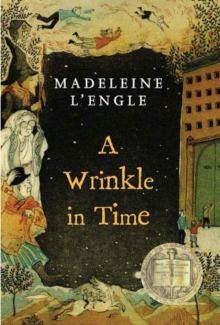 A Wrinkle in Time
A Wrinkle in Time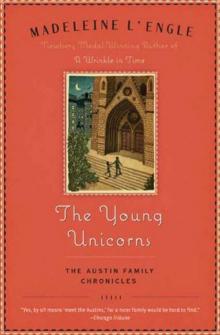 The Young Unicorns
The Young Unicorns Two-Part Invention: The Story of a Marriage
Two-Part Invention: The Story of a Marriage The Other Side of the Sun
The Other Side of the Sun A House Like a Lotus
A House Like a Lotus Certain Women
Certain Women Many Waters
Many Waters Camilla
Camilla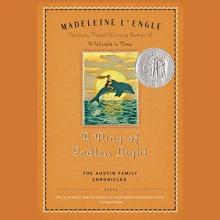 A Ring of Endless Light
A Ring of Endless Light Meet the Austins
Meet the Austins Dragons in the Waters
Dragons in the Waters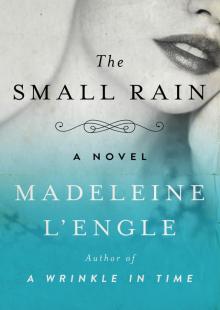 The Small Rain
The Small Rain The Moment of Tenderness
The Moment of Tenderness A Wind in the Door
A Wind in the Door Miracle on 10th Street
Miracle on 10th Street The Moon by Night
The Moon by Night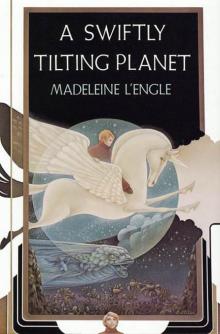 A Swiftly Tilting Planet
A Swiftly Tilting Planet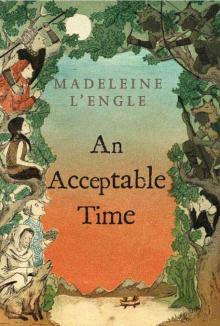 An Acceptable Time
An Acceptable Time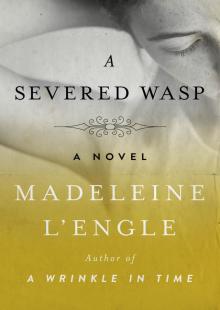 A Severed Wasp
A Severed Wasp The Irrational Season
The Irrational Season A Circle of Quiet
A Circle of Quiet A Live Coal in the Sea
A Live Coal in the Sea Troubling a Star
Troubling a Star Walking on Water: Reflections on Faith and Art
Walking on Water: Reflections on Faith and Art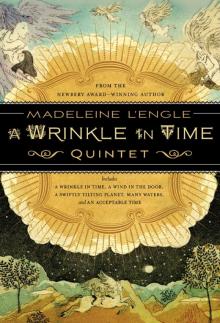 A Wrinkle in Time Quintet
A Wrinkle in Time Quintet Wrinkle in Time
Wrinkle in Time The Wrinkle in Time Quintet
The Wrinkle in Time Quintet Intergalactic P.S. 3
Intergalactic P.S. 3 Walking on Water
Walking on Water Bright Evening Star
Bright Evening Star The Rock That Is Higher
The Rock That Is Higher Madeleine L'Engle Herself
Madeleine L'Engle Herself The Arm of the Starfish
The Arm of the Starfish And Both Were Young
And Both Were Young The Twenty-four Days Before Christmas
The Twenty-four Days Before Christmas And It Was Good
And It Was Good A Stone for a Pillow
A Stone for a Pillow Do I Dare Disturb the Universe?
Do I Dare Disturb the Universe? Sold into Egypt
Sold into Egypt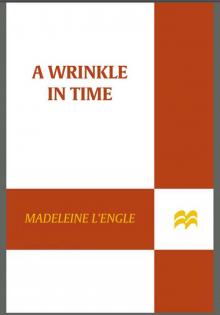 A Wrinkle in Time (Madeleine L'Engle's Time Quintet)
A Wrinkle in Time (Madeleine L'Engle's Time Quintet)